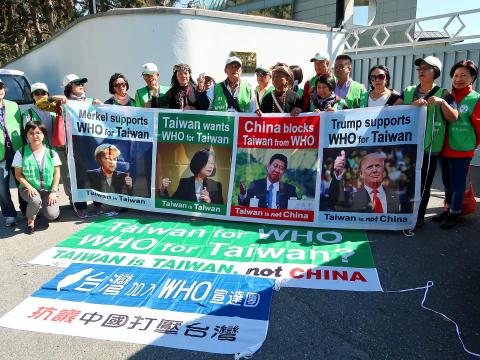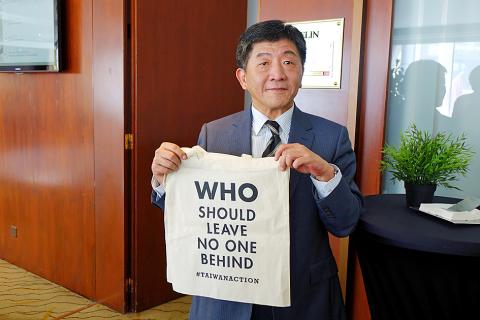Taiwan hopes its allies stand up to China’s “coercion and threats” that have shut it out of the UN’s annual World Health Assembly (WHA) meeting, Minister of Health and Welfare Chen Shih-chung (陳時中) told reporters on Saturday.
Thousands of delegates from the WHO’s 194 members are to attend the meeting in Geneva, Switzerland, that opens today, but Chen’s delegation and Taiwanese media are barred.
Chen and his delegation on Saturday arrived in Geneva hoping to meet with officials from nations participating in the WHA meeting while protesting Taiwan’s exclusion from this year’s event.

Photo: Lu Yi-hsuan, Taipei Times
Taiwan had hoped to attend this year’s session of the WHA — the decisionmaking body of the WHO, which runs through Wednesday next week — as an observer, as it had done the past eight years, but it did not get an invitation from the WHO because of China’s opposition.
“I have to call on China to realize the traditional wisdom of Chinese culture, which is that people are won over by goodwill instead of coercion and threats. That is how a big country should present itself to the world,” Chen said.
Hong-Kong born WHO Director-General Margaret Chan (陳馮富珍), whose replacement is to be elected tomorrow, has the right to invite Taiwan as an observer.

Photo: CNA
“I’m not very willing to focus criticism on an individual and I believe she must be under great pressure, but I believe that as the most important leader of the WHO she should be able to make judgements and uphold the principle of global health,” Chen said.
Chan’s successor is to be one of three candidates — from Pakistan, Ethiopia or Britain.
“Our expectations are high and we believe that the next candidate will do better and we will give them our full support,” Chen said. “You can’t afford to exclude 23 million people from the global health network.”
Taiwan wants to be at the WHA meeting to share its experience in national health insurance, disease prevention, and know-how in areas such as hepatitis C treatment, HIV/AIDS, organ transplants and craniofacial treatment, Chen said.
The WHO is also the global coordinator of responses to disease outbreaks such as SARS, which hit Asia in 2002.
“After the SARS pandemic Taiwanese people are highly concerned with the incomplete disease prevention system and the untransparent information channels of mainland China,” Chen said.
Taiwan contributes to the system, having shared information on a mutating strain of bird flu imported from China earlier this year, Chen said.
“We don’t know when things will get worse, therefore the first to see this trend has to report in time so that the world will have better and faster action in developing vaccines and medicines,” he said.
The nation’s exclusion from the WHA meeting follows a similar refusal from the UN aviation agency’s conference in Canada in September last year.
“I believe that the continuation of such incidents will only show that some parties of the world care more about politics and their own desires than about basic human rights,” Chen said.
He said he would be willing to take any opportunity to meet and make contact with health officials from China.
“It is a must for all countries to cooperate with each other on the health of their citizens and I also believe it is the responsibility of the world to make sure that Taiwan is not excluded from the global health system,” he said.
Meanwhile, three top leaders of the World Medical Association (WMA) yesterday voiced their support for Taiwan’s bid to join the WHA, during a meeting with Chen in Geneva yesterday.
Democratic Progressive Party Legislator Chiu Tai-yuan (邱泰源) said the WMA leaders’ meeting with the minister reflected their association’s staunch support for Taiwan.
The WMA previously sent an official message to the WHO asking it to send an invitation to Taiwan to attend this year’s assembly, Chiu said.
Chen said he appreciated the WMA’s support, but added that with the WHA meeting opening today, it is nearly impossible “that Taiwan would receive an invitation in time to attend as an observer.
Asked if he would try to enter the WHA conference hall to sit in the public gallery, Chen said he would not.
“If I were to attend, I would insist on being officially invited” as an observer, he said, but adding that Taiwanese lawmakers and non-governmental organization leaders might try to sit in the area set aside for members of the public.
Additional reporting by CNA

Conflict with Taiwan could leave China with “massive economic disruption, catastrophic military losses, significant social unrest, and devastating sanctions,” a US think tank said in a report released on Monday. The German Marshall Fund released a report titled If China Attacks Taiwan: The Consequences for China of “Minor Conflict” and “Major War” Scenarios. The report details the “massive” economic, military, social and international costs to China in the event of a minor conflict or major war with Taiwan, estimating that the Chinese People’s Liberation Army (PLA) could sustain losses of more than half of its active-duty ground forces, including 100,000 troops. Understanding Chinese

The Ministry of Foreign Affairs (MOFA) yesterday said it is closely monitoring developments in Venezuela, and would continue to cooperate with democratic allies and work together for regional and global security, stability, and prosperity. The remarks came after the US on Saturday launched a series of airstrikes in Venezuela and kidnapped Venezuelan President Nicolas Maduro, who was later flown to New York along with his wife. The pair face US charges related to drug trafficking and alleged cooperation with gangs designated as terrorist organizations. Maduro has denied the allegations. The ministry said that it is closely monitoring the political and economic situation

UNRELENTING: China attempted cyberattacks on Taiwan’s critical infrastructure 2.63 million times per day last year, up from 1.23 million in 2023, the NSB said China’s cyberarmy has long engaged in cyberattacks against Taiwan’s critical infrastructure, employing diverse and evolving tactics, the National Security Bureau (NSB) said yesterday, adding that cyberattacks on critical energy infrastructure last year increased 10-fold compared with the previous year. The NSB yesterday released a report titled Analysis on China’s Cyber Threats to Taiwan’s Critical Infrastructure in 2025, outlining the number of cyberattacks, major tactics and hacker groups. Taiwan’s national intelligence community identified a large number of cybersecurity incidents last year, the bureau said in a statement. China’s cyberarmy last year launched an average of 2.63 million intrusion attempts per day targeting Taiwan’s critical

‘SLICING METHOD’: In the event of a blockade, the China Coast Guard would intercept Taiwanese ships while its navy would seek to deter foreign intervention China’s military drills around Taiwan this week signaled potential strategies to cut the nation off from energy supplies and foreign military assistance, a US think tank report said. The Chinese People’s Liberation Army (PLA) conducted what it called “Justice Mission 2025” exercises from Monday to Tuesday in five maritime zones and airspace around Taiwan, calling them a warning to “Taiwanese independence” forces. In a report released on Wednesday, the Institute for the Study of War said the exercises effectively simulated blocking shipping routes to major port cities, including Kaohsiung, Keelung and Hualien. Taiwan would be highly vulnerable under such a blockade, because it